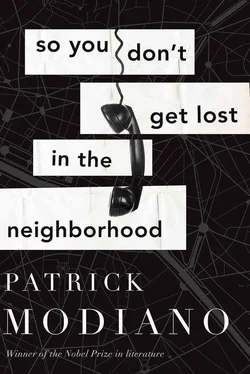“Yes. . I see. . we went to visit you there once, with your mother. .”
He stopped speaking, and he would say nothing further on the subject. It was purely a distant memory that did not concern him. One should never expect anyone to reply to one’s questions.
Nevertheless, he added:
“A very young woman. . the nightclub dancer sort. . Bob Bugnand and Torstel knew her better than I did. . and your mother too. . I believe she had been in prison. . And so why are you interested in this woman?”
“She meant a great deal to me.”
“Ah, really. . Well, I’m sorry not to be able to give you any information. . I had vaguely heard of her through your mother and Bob Bugnand. .”
His voice had taken on a sociable tone. Daragane wondered whether he was not imitating someone who had impressed him in his youth and whose mannerisms and way of speaking he had practised imitating, in the evening in front of a mirror, someone who for him, a decent, slightly naive lad, represented the height of Parisian elegance.
“The only thing that I can tell you is that she had been in prison. . I really know nothing else about this woman. .”
The neon lighting on the terrace had been switched off so as to make these last two customers realise that the café was about to close. Perrin de Lara sat there silently in the half-light. Daragane thought of the cinema in Montparnasse that he had gone into the other evening to shelter from the rain. It was not heated and the few people in the audience were still wearing their overcoats. He often kept his eyes closed in the cinema. The voices and the music in a film were more evocative for him than the image. A remark from the film he had seen that evening came to mind, spoken in a muffled voice, before the lights went on, and he had been deceived into thinking that it was he himself who had spoken it: “What a peculiar path I’ve had to take in order to reach you.”
Someone was tapping him on the shoulder:
“Gentlemen, we’re about to close. . It’s time to leave. .”
They had crossed the avenue and were walking through the garden at the spot where, during the daytime, the stalls of the postage stamp market are set up. Daragane hesitated whether to take his leave of Perrin de Lara. The man had stopped suddenly, as though an idea had suddenly crossed his mind:
“I couldn’t even tell you why she had been in prison. .”
He held out a hand which Daragane clasped.
“See you very soon, I hope. . Or perhaps in ten years’ time. .”
Daragane did not know how to answer him and he stood there, on the pavement, gazing after him. Wearing his far too flimsy coat, the man receded into the distance. He walked beneath the trees very slowly and, at the moment that he was about to cross avenue de Marigny, he almost lost his balance, propelled forward by a puff of wind and an armful of dead leaves.
BACK AT HOME, HE LISTENED TO THE ANSWERING machine to find out whether Chantal Grippay or Gilles Ottolini had left a message. None. The black dress with swallows was still lying on the back of the sofa and the orange cardboard folder was in the same place on his desk, by the telephone. He took out the photocopies.
Not a great deal, at first sight, about Annie Astrand. And yet there was. The address of the house at Saint-Leu-la-Forêt was mentioned: “15 rue de l’Ermitage”, followed by a comment that an investigation had taken place there. It had happened in the same year that Annie had taken him to the Photomaton shop and when she had been searched at the customs post at Ventimiglia. Her brother Pierre (6 rue Laferrière, Paris IXe) was mentioned as was Roger Vincent (12 rue Nicolas-Chuquet, Paris XVIIe), whom they wondered might not be her “protector”.
It even specified that the house at Saint-Leu-la-Forêt was in the name of Roger Vincent. There were also copies of a much older report from the Criminal Investigation Department, Vice Squad, Investigation and Information Bureau, concerning the aforementioned Astrand Annie living in a hotel, 46 rue Notre-Dame-de-Lorette, on which was written: “Known at the Étoile Kléber”. But all this was unclear, as though someone — Ottolini? — when copying out documents from the archives in a hurry, had skipped words and had jumbled together certain sentences taken at random that had no connection one with the other.
Was it really worthwhile burying oneself in this dense and viscous mass again? As he continued with his reading, Daragane experienced a feeling similar to that of the previous day when he tried to decipher the same pages: sentences you hear in a semi-slumber, and the few words you do remember in the morning make no sense. All this, strewn with specific addresses—15 rue de l’Ermitage, 12 rue Nicolas-Chuquet, 46 rue Notre-Dame-de-Lorette — probably in order to find reference points in this shifting sand.
He was sure that he would tear up these pages over the coming days and that this would make him feel better. Between now and then, he would leave them on his desk. One final reading might conceivably help him discover hidden clues that would put him on the trail of Annie Astrand.
He needed to find the envelope that she had sent him, years ago, containing the passport photos. On the day he received it, he had consulted the current street directory. No Annie Astrand at number 18 rue Alfred-Dehodencq. And since she had not given him her phone number, all he could do was write to her. . But would he receive an answer from her?
That evening, in his study, all this seemed so long ago. . It was already ten years since the beginning of the new century. . And yet, at a bend in the road, or spotting a passing face — and often it only required an unexpected word in a conversation or a note of music — the name, Annie Astrand, came back into his memory. But it happened increasingly seldom and more and more briefly, a bright signal that faded immediately.
He had hesitated whether to write to her or send her a telegram. 18 rue Alfred-Dehodencq. PLEASE GIVE PHONE NUMBER. JEAN. Or a pneumatic dispatch, of the kind that people still sent in those days. And then he, who neither liked unexpected visits nor people who suddenly accost you in the street, had decided to call at that address.
IT WAS IN AUTUMN, ON ALL SAINTS’ DAY. IT WAS sunny, that afternoon. For the first time in his life, the words “All Saints” did not instil in him a feeling of sadness. At place Blanche, he had taken the métro. Two changes were required. At Étoile and Trocadéro. On Sundays and public holidays, the trains took a long time coming, and he thought to himself that he would have been unable to have seen Annie Astrand again except on a public holiday. He counted the years: fifteen, since the afternoon she had taken him to the Photomaton shop. He remembered a morning, at the gare de Lyon. They had both boarded the train, a crowded train on the first day of the summer holidays.
While waiting for the train at Trocadéro station, he had a sudden doubt: she might not be in Paris that day. After fifteen years, he would no longer recognise her.
There were railings at the end of the street. Behind them were the trees in the Ranelagh gardens. Not a single car the entire length of the pavement. The silence. Hard to imagine anyone living here. Number 18 was at the very end, on the right, before the railings and the trees. A white building, or rather a large house with two storeys. At the entrance door, an intercom. And a name, alongside the single button of this intercom: VINCENT.
The building seemed to him to be deserted, like the street. He pressed the button. From the intercom, he heard a crackling sound, which could have been the rustle of the wind in the trees. He leant forward and, enunciating the syllables clearly, he said twice: “JEAN DARAGANE”. A woman’s voice, partly muffled by the noise of the wind, replied: “First floor.”
Читать дальше












